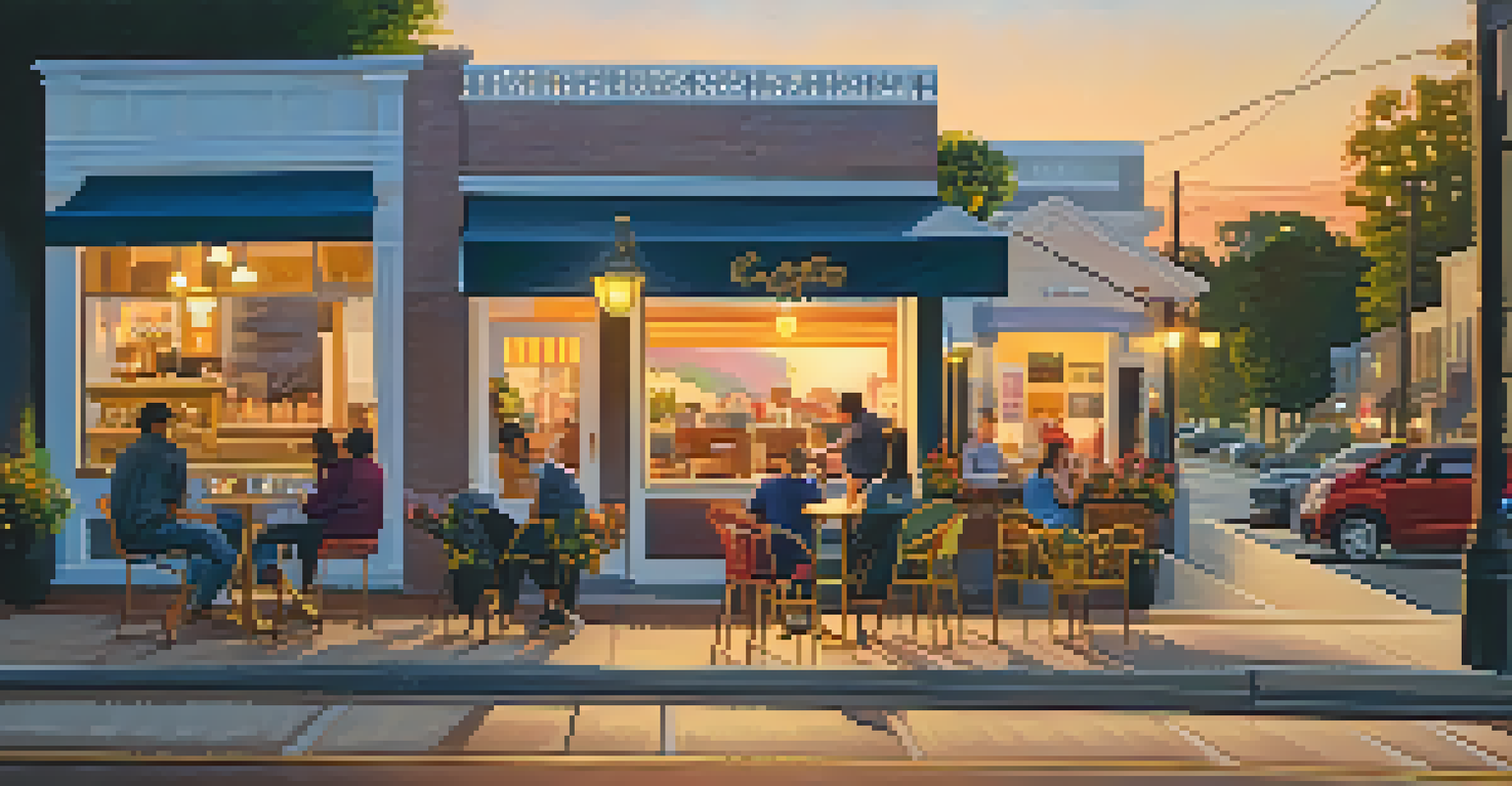How Social Media Trends Affect Real Estate Values

The Rise of Social Media in Real Estate Marketing
In recent years, social media has transformed how real estate is marketed. Platforms like Instagram and Facebook allow realtors to showcase properties visually, attracting potential buyers with stunning photos and engaging videos. This shift has made it easier for sellers to reach a broader audience, which can ultimately drive up demand and influence property values.
Social media is not just a marketing tool; it's a powerful driver of real estate value.
For example, a beautifully staged home featured in a viral post can garner significant attention, leading to multiple offers. The emotional connection buyers form through these captivating visuals often translates into a willingness to pay a premium. As such, social media is not just a marketing tool; it's a powerful driver of real estate value.
Moreover, the interactive nature of social media enables realtors to engage with their audience directly, answering questions and providing insights about the local market. This interaction builds trust and credibility, further enhancing the perceived value of the properties being marketed.
Influencer Marketing's Role in Real Estate Trends
Influencer marketing has emerged as a game-changer in the real estate landscape. Real estate influencers, often with large social media followings, can spotlight properties and neighborhoods, effectively shaping public perception. Their endorsements can make certain areas more desirable, directly impacting property values.

For instance, when a popular lifestyle influencer shares their new home or a local favorite neighborhood, their followers take notice. This newfound attention can lead to increased interest in those areas, resulting in a spike in home prices. It's a clear illustration of how social media trends can elevate the value of real estate simply through visibility.
Social Media Boosts Property Value
Platforms like Instagram and Facebook enable realtors to showcase properties visually, attracting potential buyers and driving up demand.
Additionally, influencers often create a narrative around a lifestyle that resonates with their audience. By associating specific properties with aspirational living, they can drive demand in ways traditional advertising cannot. This trend highlights the importance of understanding the influence of social media in today’s real estate market.
User-Generated Content and Property Valuation
User-generated content (UGC) has gained traction as a key factor in real estate marketing. When buyers share their experiences, photos, and stories about their homes on social media, it creates a sense of community and authenticity. This content can significantly influence potential buyers' perceptions, thereby affecting property values.
In the age of social media, online reviews have become a critical component of buyer research.
For example, a neighborhood where residents frequently share positive experiences online can attract new buyers looking for a sense of belonging. This community-driven narrative can enhance the appeal of homes in that area, leading to increased demand and rising values. As such, UGC acts as a powerful endorsement for both properties and neighborhoods.
Moreover, UGC often highlights unique aspects of a property or community that professional marketing might overlook. This grassroots approach offers potential buyers an insider's perspective, making them more likely to invest in a property that feels personally endorsed by other residents.
The Impact of Local Trends on Real Estate Prices
Local social media trends can have a profound impact on real estate values. For instance, if a neighborhood becomes trendy on platforms like TikTok, showcasing local businesses, parks, or events, it can draw attention from potential buyers. This buzz can lead to increased demand, ultimately driving up property prices in that area.
Consider a scenario where a local coffee shop goes viral on social media. Buyers might suddenly find the surrounding neighborhood appealing, leading to a surge in home sales and higher property values. This illustrates how the digital landscape can swiftly alter perceptions and desirability in real estate markets.
Influencers Shape Real Estate Trends
Real estate influencers can spotlight properties and neighborhoods, increasing their desirability and impacting property values.
Additionally, social media can highlight local events or cultural movements that resonate with specific demographics, attracting buyers who identify with those trends. This alignment of social media trends with local real estate markets showcases an intricate relationship between online engagement and property valuation.
Virtual Tours and Their Effect on Buyer Decisions
Virtual tours have revolutionized the way potential buyers explore properties. By utilizing platforms like YouTube or Facebook Live, realtors can showcase homes in an immersive way, allowing buyers to experience them from the comfort of their own homes. This convenience can lead to quicker sales and potentially higher offers, affecting overall property values.
For instance, a well-executed virtual tour can attract buyers from outside the local area, expanding the market for a property. This influx of interest can create competition among buyers, which often drives prices up. Thus, the ability to reach a wider audience through virtual tours is a significant factor in today's real estate market.
Moreover, virtual tours help buyers feel more informed and confident in their decisions. When buyers can view a property in detail, they are more likely to make competitive offers, enhancing the overall market value of homes in that area. This trend demonstrates the importance of adapting to technological advancements in real estate.
The Role of Online Reviews in Property Perception
In the age of social media, online reviews have become a critical component of buyer research. A property’s online reputation can significantly influence its market value, as potential buyers often consider reviews when making purchasing decisions. Positive reviews can enhance a property's desirability, while negative feedback can deter buyers and lower values.
For example, if a neighborhood receives rave reviews for its schools, parks, and community events, it can attract families looking for a great place to live. This positive perception can drive up home values as demand rises. Conversely, negative reviews about safety or amenities can have the opposite effect, highlighting the impact of social media sentiment on real estate.
Online Reviews Drive Buyer Decisions
A property's online reputation, influenced by reviews, plays a significant role in shaping buyer perceptions and market value.
Additionally, realtors are often evaluated based on their online presence and reviews. A realtor with numerous positive testimonials may command a higher commission, reflecting their perceived value in the market. This relationship underscores the importance of maintaining a strong online reputation in the competitive real estate landscape.
The Future of Social Media and Real Estate Values
As social media continues to evolve, its influence on real estate values is likely to grow. New platforms and technologies, such as augmented reality and AI-driven analytics, will shape how properties are marketed and perceived. Staying ahead of these trends can provide buyers and sellers with a competitive advantage in the market.
For instance, as virtual reality becomes more accessible, we may see even more immersive property experiences that can attract buyers from across the globe. This trend could further inflate property values in desirable locations, as the ability to 'visit' a home remotely becomes more realistic and appealing. Understanding these future trends is essential for anyone involved in real estate.

Additionally, the continued rise of social media will likely create new opportunities for community engagement and marketing strategies. As realtors and buyers alike adapt to these changes, the relationship between social media trends and real estate values will remain a dynamic and integral aspect of the market.